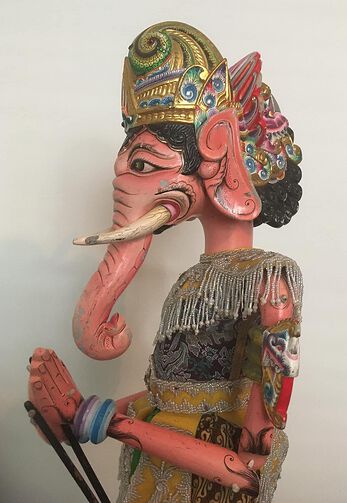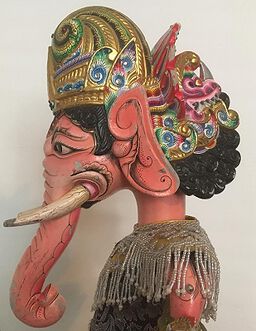Ganesha: Difference between revisions
(Created page with "My name is Manuel and I am studying Directing and Neuroscience at St Levan / Great Britain.<br><br>Also visit my web-site Kometa web casino ([https://game-ss.ru/ game-ss.ru]) ") |
(Created page with "My name is Manuel and I am studying Directing and Neuroscience at St Levan / Great Britain.<br><br>Also visit my web-site Kometa web casino ([https://game-ss.ru/ game-ss.ru]) ") |
||
| Line 5: | Line 5: | ||
|Other names=Gahjasena, Kaneka | |Other names=Gahjasena, Kaneka | ||
|Size=60 cm | |Size=60 cm | ||
|Personal data=Ganesa is a son of Siwa and Dewi Parwati. | |Personal data=Ganesa is a son of Siwa and Dewi Parwati. The story of Ganesha describes that his mother Parvati created him from the dust of her own body. She decided to revive him and ask him to protect her. Ganesha is the Hindu god of wisdom and knowledge. | ||
|Collection=Private collection | |Collection=Private collection | ||
|Appearance=Ganesha is loving, kind and polite. He writes the "Mahabharata" for Abiasa on palm leaves. | |||
}} | }} | ||
== Ganesa - (Dewa) - Mahabharata == | ==Ganesa - (Dewa) - Mahabharata== | ||
After | After his marriage to Parvati, Shiva went to the sacred mountain Kailash to meditate. He became so engrossed in his meditation that years passed. Returning home, he found a young man at the door who would not let anyone in because his mother was taking a bath inside. Shiva did not realize that he was now the father of a son and Ganesha, who had never seen his father, naturally did not recognize him.<p> | ||
Shiva did not accept that a boy would not let him into his own house and a fight ensued in which Shiva beheaded his son. Only when a hysterical Parvati made it clear to him that it was his own child did Shiva regain his senses. With the boy's body and head he went to Brahma, the god of creation. A first attempt to revive the boy by placing the head back on the body failed. Worse still, the head rolled away and became untraceable. A compromise was sought and found. Shiva had to kill the first living creature he saw and he was able to place the head of this creature on the body of his son, after which Brahma would stitch it up. The baby elephant that Shiva then encountered died and Ganesha continued through life with an elephant's head. Shiva consoled Parvati with the promise that their son Ganesha would become the most revered god. As God of good fortune, he is the first to be honored at all Hindu festivals!<p> | |||
The vehicle of Ganesha, the elephant god, is a mouse or rat, called Mashika. It may look comical, but it still stands for something. According to some, the mouse or rat he rides is the symbol of the gnawing ego. If you look at it this way, it means something like letting common sense rule over the ego.<p> | |||
Many Hindus pray to Ganesha when starting something new, such as a new job, starting a business or when moving. The god could remove obstacles and help you overcome them. Ganesha is also said to protect you when you travel. You often see the elephant god at the entrance of houses, along the side of the road and at T-junctions. | |||
[[Category:Wayang Golek Puppets]] | [[Category:Wayang Golek Puppets]] | ||
Revision as of 20:29, 4 October 2023
| Title | Ganesa - (Dewa) - Mahabharata |
|---|---|
| Other names | Gahjasena, Kaneka |
| Size | 60 cm |
| Personal data | Ganesa is a son of Siwa and Dewi Parwati. The story of Ganesha describes that his mother Parvati created him from the dust of her own body. She decided to revive him and ask him to protect her. Ganesha is the Hindu god of wisdom and knowledge. |
| Appearance | Ganesha is loving, kind and polite. He writes the "Mahabharata" for Abiasa on palm leaves. |
| Collection | Private collection |
Ganesa - (Dewa) - Mahabharata
After his marriage to Parvati, Shiva went to the sacred mountain Kailash to meditate. He became so engrossed in his meditation that years passed. Returning home, he found a young man at the door who would not let anyone in because his mother was taking a bath inside. Shiva did not realize that he was now the father of a son and Ganesha, who had never seen his father, naturally did not recognize him.
Shiva did not accept that a boy would not let him into his own house and a fight ensued in which Shiva beheaded his son. Only when a hysterical Parvati made it clear to him that it was his own child did Shiva regain his senses. With the boy's body and head he went to Brahma, the god of creation. A first attempt to revive the boy by placing the head back on the body failed. Worse still, the head rolled away and became untraceable. A compromise was sought and found. Shiva had to kill the first living creature he saw and he was able to place the head of this creature on the body of his son, after which Brahma would stitch it up. The baby elephant that Shiva then encountered died and Ganesha continued through life with an elephant's head. Shiva consoled Parvati with the promise that their son Ganesha would become the most revered god. As God of good fortune, he is the first to be honored at all Hindu festivals!
The vehicle of Ganesha, the elephant god, is a mouse or rat, called Mashika. It may look comical, but it still stands for something. According to some, the mouse or rat he rides is the symbol of the gnawing ego. If you look at it this way, it means something like letting common sense rule over the ego.
Many Hindus pray to Ganesha when starting something new, such as a new job, starting a business or when moving. The god could remove obstacles and help you overcome them. Ganesha is also said to protect you when you travel. You often see the elephant god at the entrance of houses, along the side of the road and at T-junctions.


